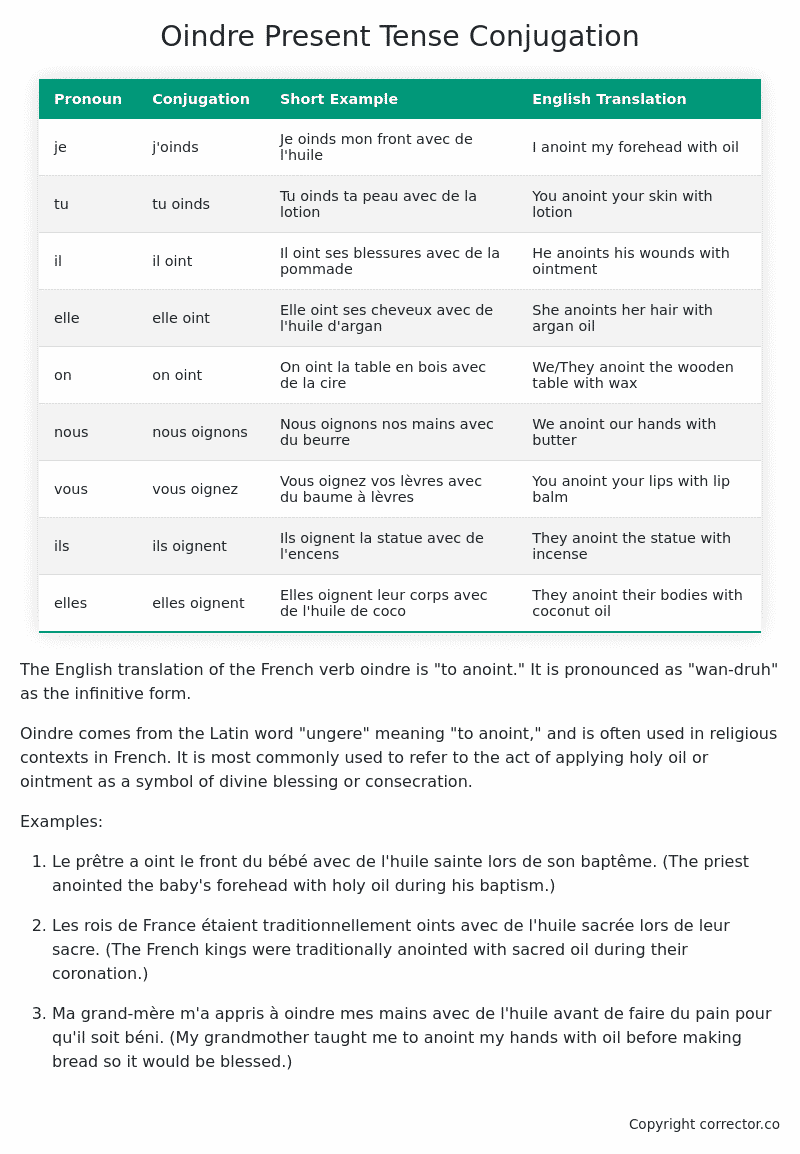Le Present (Present Tense) Conjugation of the French Verb oindre
Introduction to the verb oindre
The English translation of the French verb oindre is “to anoint.” It is pronounced as “wan-druh” as the infinitive form.
Oindre comes from the Latin word “ungere” meaning “to anoint,” and is often used in religious contexts in French. It is most commonly used to refer to the act of applying holy oil or ointment as a symbol of divine blessing or consecration.
Examples:
-
Le prêtre a oint le front du bébé avec de l’huile sainte lors de son baptême. (The priest anointed the baby’s forehead with holy oil during his baptism.)
-
Les rois de France étaient traditionnellement oints avec de l’huile sacrée lors de leur sacre. (The French kings were traditionally anointed with sacred oil during their coronation.)
-
Ma grand-mère m’a appris à oindre mes mains avec de l’huile avant de faire du pain pour qu’il soit béni. (My grandmother taught me to anoint my hands with oil before making bread so it would be blessed.)
Oindre – About the French Present Tense
To take a deep dive into all the French tenses then see our article on Mastering French Tense Conjugation.
Common Everyday Usage Patterns For Le Present
Interactions with Other Tenses
Table of the Present Tense Conjugation of oindre
| Pronoun | Conjugation | Short Example | English Translation |
|---|---|---|---|
| je | j’oinds | Je oinds mon front avec de l’huile | I anoint my forehead with oil |
| tu | tu oinds | Tu oinds ta peau avec de la lotion | You anoint your skin with lotion |
| il | il oint | Il oint ses blessures avec de la pommade | He anoints his wounds with ointment |
| elle | elle oint | Elle oint ses cheveux avec de l’huile d’argan | She anoints her hair with argan oil |
| on | on oint | On oint la table en bois avec de la cire | We/They anoint the wooden table with wax |
| nous | nous oignons | Nous oignons nos mains avec du beurre | We anoint our hands with butter |
| vous | vous oignez | Vous oignez vos lèvres avec du baume à lèvres | You anoint your lips with lip balm |
| ils | ils oignent | Ils oignent la statue avec de l’encens | They anoint the statue with incense |
| elles | elles oignent | Elles oignent leur corps avec de l’huile de coco | They anoint their bodies with coconut oil |
Other Conjugations for Oindre.
Le Present (Present Tense) Conjugation of the French Verb oindre (this article)
Imparfait (Imperfect) Tense Conjugation of the French Verb oindre
Passé Simple (Simple Past) Tense Conjugation of the French Verb oindre
Passé Composé (Present Perfect) Tense Conjugation of the French Verb oindre
Futur Simple (Simple Future) Tense Conjugation of the French Verb oindre
Futur Proche (Near Future) Tense Conjugation of the French Verb oindre
Plus-que-parfait (Pluperfect) Tense Conjugation of the French Verb oindre
Passé Antérieur (Past Anterior) Tense Conjugation of the French Verb oindre
Futur Antérieur (Future Anterior) Tense Conjugation of the French Verb oindre
Subjonctif Présent (Subjunctive Present) Tense Conjugation of the French Verb oindre
Subjonctif Passé (Subjunctive Past) Tense Conjugation of the French Verb oindre
Subjonctif Imparfait (Subjunctive Imperfect) Tense Conjugation of the French Verb oindre
Subjonctif Plus-que-parfait (Subjunctive Pluperfect) Tense Conjugation of the French Verb oindre
Conditionnel Présent (Conditional Present) Tense Conjugation of the French Verb oindre
Conditionnel Passé (Conditional Past) Tense Conjugation of the French Verb oindre
L’impératif Présent (Imperative Present) Tense Conjugation of the French Verb oindre
L’infinitif Présent (Infinitive Present) Tense Conjugation of the French Verb oindre
Struggling with French verbs or the language in general? Why not use our free French Grammar Checker – no registration required!
Get a FREE Download Study Sheet of this Conjugation 🔥
Simply right click the image below, click “save image” and get your free reference for the oindre Present Tense tense conjugation!

I hope you enjoyed this article on the verb oindre. Still in a learning mood? Check out another TOTALLY random French verb present conjugation!



